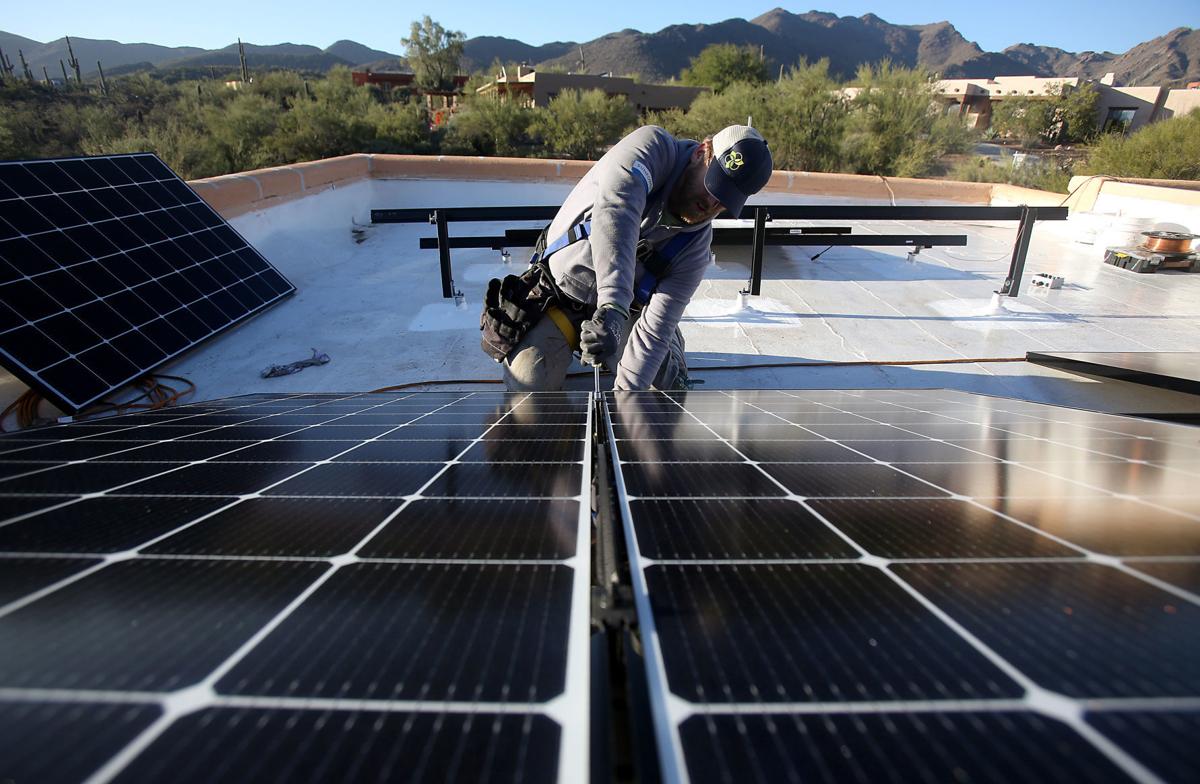The Arizona Corporation Commission, a five-member elected body that regulates Tucson Electric Power Co. and other electric utilities in the state, is trying to determine the value of “distributed generation” — primarily customer-owned rooftop photovoltaic solar energy systems — for rate-setting purposes.
Here’s what you need to know:
Q: Why is the commission studying the value of rooftop solar and why is it important?
A: The value of rooftop solar installations has been the subject of debate during utility rate cases for years. Most recently TEP, Arizona Public Service and other utilities have filed rate cases that include proposals to increase charges and reduce benefits to customers with grid-tied rooftop solar systems, contending that by avoiding buying power from the grid they aren’t paying their fair share of fixed system costs.
Solar advocates say the benefits of rooftop solar, including offsetting polluting fossil-fuel power generation and delaying the need to build new power plants, outweigh any costs.
Q: What kind of changes are the utilities proposing to the treatment of rooftop solar customers?
A: The proposals are varied but generally involve higher charges, along with cuts and perhaps eventual elimination of net metering — the process by which rooftop solar customers are compensated for excess energy their systems produce.
Q: I have a grid-connected photovoltaic system and currently receive credit for my system’s solar production from my utility. Will the new rules affect me?
A: Probably not. TEP and other utilities proposed changes with effective dates now since passed, but a hearing officer has recommended that any new rates or changes to net metering become effective only for customers whose systems are approved for utility hookup when the utilities new rates go into effect.
TEP has requested that its new rates go into effect Jan. 1, but that has been delayed, and the solar net metering changes are expected be considered in a second phase of the rate case sometime early next year.
Q: What is net metering?
A: Net metering is the process by which customers with rooftop solar systems are compensated for the excess energy their systems produce.
Currently, rooftop solar customers in TEP territory are credited for the full retail rate of about 11.5 cents per kilowatt-hour for any excess power they produce within a month, and if they produced more power than used in a month the credits are carried over, or banked, to offset usage in the following month.
At the end of the billing year, rooftop solar customers are paid for any remaining credits at TEP’s “market cost of comparable conventional generation,” a wholesale price now set at about 2.5 cents per kilowatt hour.
Q: What changes are being proposed to net metering?
A: TEP, APS and other utilities want to reduce net-metering credit rates from retail power rates to rates based on the costs avoided by distributed generation of solar power, or on a proxy rate based on the wholesale cost of power.
The credit rate based on avoided costs would require cost-of-service studies, but APS has estimated that at about 3 cents per kilowatt-hour. TEP has proposed using the cost of power from its most recent renewable-energy power purchase agreement, previously estimated at about 5.8 cents per kilowatt hour.
TEP also wants to eliminate any banking of solar-power credits.
Q: What impact are lower net-metering credits expected to have on the residential rooftop solar market?
A: Solar industry representatives said cutting net-metering credits would lengthen the payback period for home solar systems, making solar uneconomical for many households and potentially devastating the industry.
They cite Nevada, which saw its residential rooftop solar industry collapse after its public utility commission last year approved higher charges on rooftop solar customers of NV Energy and a phase-out of retail-rate net metering.
After a public outcry and litigation, the Nevada Public Utilities Commission approved a settlement that grandfathers some 32,000 solar customers under the old rules.
Q: What other changes in treatment of solar customers are the Arizona utilities seeking?
A: Both APS and TEP have proposed higher fixed charges on rooftop solar customers and have urged consideration of so-called “demand rates,” which base part of a customer’s bill on a period of peak usage. Those proposals will be taken up as part of individual rate cases, based partly on findings from the value-of-solar proceeding.





